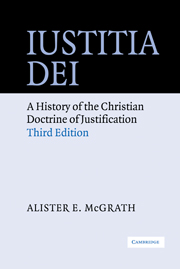Book contents
- Frontmatter
- Contents
- Preface
- List of abbreviations
- 1 Justification: the emergence of a concept
- 2 The Middle Ages: the consolidation of the doctrine
- 3 Protestantism: the Reformation debates on justification
- 4 Catholicism: the Council of Trent on justification
- 5 The modern period
- Glossary of medieval soteriological terms
- Bibliography
- Index
4 - Catholicism: the Council of Trent on justification
Published online by Cambridge University Press: 05 June 2012
- Frontmatter
- Contents
- Preface
- List of abbreviations
- 1 Justification: the emergence of a concept
- 2 The Middle Ages: the consolidation of the doctrine
- 3 Protestantism: the Reformation debates on justification
- 4 Catholicism: the Council of Trent on justification
- 5 The modern period
- Glossary of medieval soteriological terms
- Bibliography
- Index
Summary
The Catholic church was ill prepared to meet the challenge posed by the rise of the evangelical faction within Germany and elsewhere in the 1520s and 1530s. Luther's doctrine of justification attracted considerable attention in the 1520s, not all of it unsympathetic. According to Schmidt, three reasons may be suggested to explain the remarkable importance which came to be attached within contemporary Catholicism to the doctrine of justification sola fide. First, it required an internalisation of the religious life, thus sharply contrasting with the prevailing external forms of Christian existence. Second, it restored an emphasis upon the priority of the divine role in justification, against the prevailing tendency to concentrate upon the human role. Third, it amounted to an implicit declaration of war upon the Roman curia. Relatively few works dealing with the doctrine of justification were published within Catholicism in the period 1520–45, with notable exceptions such as Tommaso de Vio Cajetan's De fide et operibus (1532). A survey of such works suggests that the Lutheran doctrine of justification was simply not understood by the early opponents of the Reformation, although the rise of polemical theology in the 1530s served to clarify points of importance. Early anti-Lutheran polemic tended to fasten upon points which Luther regarded as trivial – such as Luther's views on the papacy, indulgences or the sacraments – while failing to deal with such crucial questions as the concept of servum arbitrium or the nature of justifying righteousness.
- Type
- Chapter
- Information
- Iustitia DeiA History of the Christian Doctrine of Justification, pp. 308 - 357Publisher: Cambridge University PressPrint publication year: 2005



